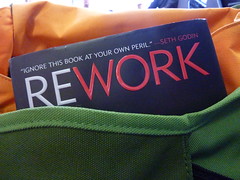...because it limits your creativity for what you can do with your business.
IMO, and this is similar to one of those theories that
Dilbert makes up, the word should was not in our dictionary when we came into this world (yeah yeah, neither were the other 10 billion words we would soon learn).
As soon as we learned the word should, here's what happened.
...you should eat your vegetables.
...you should not try to fly - somebody gonna hurt real bad.
...you should not stay up late.
...you should word hard at your academics.
...you should this, that, you get the idea.
Same goes for business.
...you should build your business this way because it's been proven.
...you should cater to this group of customers because according to research this group has the most money.
...you should hire so and so.
...you should fire so and so.
...you should get senior people on the team.
...you should not badmouth the banks.
...you should not take a stand early in your business to be "under the radar".
I think I've hit a spot where I am seriously sick and tired of the word should and how I have been running my business by it. SO. Everything needs to get put back in its place.
Who cares if that customer group has the most money?! If they don't love what we have to offer, then they're not going to pay us!
Who cares if so and so is a superstar in the industry?! If they don't love selling what we have to offer, they're not going to generate results!
Who cares if we upset some people out there by positioning ourselves as an anti-something?! If we don't upset some people then we're neutral to everybody and the business might as well be dead. I take a stand for what I believe in. It's time I let my business do that too.
So how is the word
should screwing over your business or even your life? Delete it from your vocabulary. One book I recently read suggests replacing it with the word
want. Works if it's something that you need to get done.
For example:
I
want to hire so and so.
I
want to spend on marketing.
I
want the company to be positioned like this.
YOU. YOU. YOU. You own and run the business. Once you start using the word 'should' you are letting other things that exist determine what you should do. That ties your hands, and feet, from doing and creating whatever awesomeness will come out of your business.
 Coke Bombs
Coke Bombs
 Facebook Logo
Facebook Logo 










![Reblog this post [with Zemanta]](http://img.zemanta.com/reblog_e.png?x-id=e7aa02d2-5f1c-4e45-9886-c8a0a04f371f)